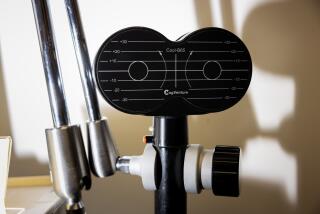Exotic Ways to Learn Doubted by U. S. Study
WASHINGTON — The National Academy of Sciences said Thursday that a two-year study has found little scientific evidence to support claims that biofeedback and other exotic methods for alleviating stress, improving memory and accelerating learning work any better than conventional methods of teaching.
There is some indication that techniques of “sleep-learning” and the mental practice of physical skills can reinforce learning, a committee of experts convened by the academy said. But they concluded emphatically that 130 years of research has produced “no scientific justification” to support widespread belief in the existence of extrasensory perception, mental telepathy or similar phenomena.
The $425,000 study was funded by the Army to determine whether a variety of unconventional techniques that claim to intensify a person’s learning ability could be used in training soldiers. But the 14 psychologists, educators and training specialists who conducted the study said their conclusions--mostly negative--also apply to the multibillion-dollar business of personal improvement and the training of civilian workers in a variety of skills.
The academy committee reviewed research on commercial “super-learning” techniques now in vogue such as neuro-linguistic programming and exercises that claim to link the powers of the brain’s two partly independent hemispheres. These and other methods, it noted, are used in widely marketed programs that claim to help people achieve goals such as losing weight, improving their tennis games and developing leadership skills.
‘Dearth of Evidence’
“We found an overall dearth of scientific evidence to support the claims made for many of these techniques,” John A. Swets, the study’s chairman, said at a news briefing that summarized the committee’s 299-page report.
Swets, noting that little more than the testimonials of satisfied customers appears to underlie such techniques, said that a large body of behavioral research has shown such testimonials to be unreliable.
“Even very sincere people can suffer from selective memory, errors of attribution and other lapses when asked how they came to learn or believe something,” said Swets, of the consulting firm of Bolt Beranek & Newman Inc., in Cambridge, Mass.
In its review of the scientific literature, the committee said it found three unconventional methods of learning that deserve further study: learning during sleep, mental practice of physical skills and some features of so-called “accelerated learning” programs.
Sleep Learning Evaluated
Swets said there is evidence that material such as foreign language vocabulary presented to students during the lighter stages of sleep may bolster their ability to learn the same material when fully awake. But he emphasized that the researchers found “no reliable evidence that learning itself occurs during true sleep.”
Similarly, the technique of watching films or videotapes of athletes performing, then mentally rehearsing their moves, appears effective in teaching muscular skills, especially when the skill requires mental concentration and when mental practice is combined with physical practice.
The committee said the military also would be justified in looking more closely at certain “super-learning” methods that combine conventional teaching and motivational techniques with relaxation techniques and special background music. It said there is little evidence that the music and other exotic aspects lend any help but that these methods may make innovative use of ordinary teaching techniques.
By contrast, it found what Swets said is “little or no scientific evidence” for techniques that purport to enhance mental powers by integrating the brain’s hemispheres. The scientific basis for neuro-linguistic programming--a technique that claims to help people absorb information through the use of mental pictures and symbolic sounds--also was said to be “generally weak or negative.”
Mixed Biofeedback Verdict
The verdict on biofeedback, which uses electronic monitoring of brain waves and muscle activity to alleviate tension, was mixed. Although studies show that biofeedback can help reduce muscular tension, the committee said it is not useful for reducing the underlying mental or emotional stress. The best method of stress reduction, it said, is to reduce the element of surprise and tell someone what is likely to happen in stressful circumstances--whether in combat or in a corporate meeting.
The academy committee reserved its sharpest criticism for the realm of parapsychology and claims of evidence for such phenomena as extrasensory perception, mental telepathy and the putative use of mental power to bend spoons and jam computers.
Committee members, noting that news media sometimes accuse the U.S. military of falling behind the Soviet Union in the “mind race,” said it appears that the Army had once considered setting up what it called a “First Earth Battalion” composed of “warrior monks” whose mastery of psychic powers might enable them to jam enemy computers, trigger nuclear weapons prematurely and walk through walls.
Idea Traced to Colonel
The idea was quickly abandoned, and its originator, said to have been a lieutenant colonel at Ft. Leavenworth, Kan., is now a private consultant.
It turns out, chairman Swets observed, that there is no mind-race to lose.
“Despite a 130-year record of scientific research on such matters, we could find no scientific justification for the existence” of such mental powers, he said, adding that “even some parapsychologists have agreed with us” that the general quality of the research in this field was surprisingly poor.
If anything, Swets said, Soviet researchers in the field of parapsychology seemed even less concerned about scientific rigor than their American colleagues, with the result that “their work is even less convincing than ours.”






